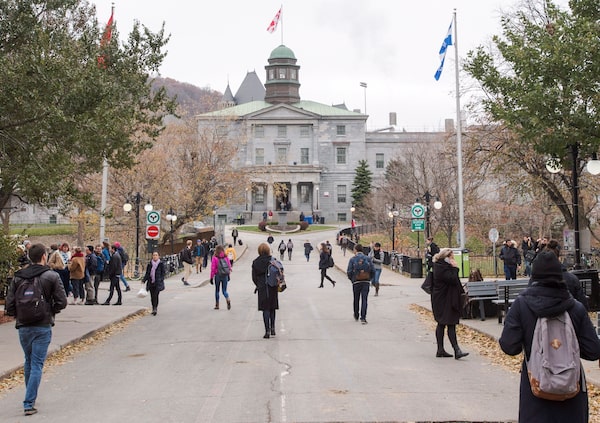
McGill intends to argue that Quebec’s tuition hike is a disguised tax that will be imposed on students without being passed by the provincial legislature.Ryan Remiorz/The Canadian Press
Quebec’s two largest English universities are launching legal action against the government’s move to raise tuition for out-of-province students and change the funding model around international students.
McGill and Concordia universities announced Friday they are pursuing separate court proceedings against the government, a last-ditch attempt to head off new rules the universities say are discriminatory and will hurt them financially.
Concordia University president Graham Carr said he believes the Quebec government has failed to live up to its obligation, based on the Charter of Rights and Freedoms, to protect a minority language institution.
“They didn’t do their legal homework in terms of upholding their responsibilities to minority educational institutions and ensuring that the policies they put in force do the least harm possible,” Dr. Carr said in an interview. “On the contrary, the policies they have put in seem designed to inflict harm on the English institutions.”
In December the CAQ government of Premier François Legault announced that tuition at McGill and Concordia, English-language universities in Montreal, would rise to $12,000 in September for students from other provinces, up from $9,000 this year.
The government has said the policy was motivated by a desire to protect the French language, which it believes is under threat in Montreal.
The government also announced it will redistribute to other universities a portion of the funds collected from international tuition, part of what it calls a rebalancing of postsecondary finances, which the universities argue will have a disproportionate impact on McGill and Concordia. Dr. Carr said under the new rules, which apply to international undergraduate and course-based master’s students, Concordia would lose about $5,000 to $6,000 per student, per year, which would further weaken its financial position.
McGill University to provide scholarships that cover tuition increase for out-of-province students
“The government significantly increased tuition fees for out-of-province students attending anglophone universities only and imposed a new fee structure for international students that will have disproportionately negative financial consequences for anglophone universities,” Dr. Carr said in a statement to campus Friday.
In its court filing, Concordia states that the policy is based on stereotypes and false assumptions, not data. It said the policy is “expressly designed to cause a sharp decline in Concordia’s enrolment, and to thereby purposefully weaken Concordia as an institution.” The filing argues the Minister failed to consider and balance Charter values around the right to equality, mobility rights and minority language education rights.
Dr. Carr described the two legal cases launched by the neighbouring schools as separate, but complementary and co-ordinated.
In a statement released to its campus Friday, McGill said its lawsuit will argue that the changes introduced by the government constitute discrimination under the Canadian and Quebec Charters and are an unreasonable exercise of power by the Minister of Higher Education incompatible with the responsibilities outlined in legislation.
McGill also intends to argue that the tuition hike is a disguised tax that will be imposed on students without being passed by the provincial legislature, and that the differential fee charged to out-of-province students is a barrier to interprovincial trade that interferes with their mobility and access to education.
Simon Savignac, a spokesman for Quebec Higher Education Minister Pascale Déry, said the Minister would not comment on the matter now that it’s before the courts. Both universities filed applications for judicial review in Quebec Superior Court.
McGill is seeking a stay that would stop the new tuition policy from coming into force while the matter is argued.
“We are undertaking this legal action because we believe that these measures are illegal and if upheld, will threaten McGill’s mission, its place as one of the world’s top universities and its vital role in Quebec,” McGill president Deep Saini said in a statement. “We would have greatly preferred not to do this, but we have run out of viable alternatives.”
Allan Hutchinson, a professor at Osgoode Hall who teaches constitutional law, said it’s important to note that a court action is often as much a political manoeuvre as a legal one. He said the cases could take years to be decided as they’re argued and then potentially appealed, but in the meantime they will focus public attention and potentially create pressure for a negotiated solution. In the short term he would be surprised if the court grants a stay, he added.
The impact of the new policy is evident in the drop in applications for September, the universities argue. McGill saw a 22-per-cent drop in applications from Canadian students from outside Quebec compared with a year ago, while Concordia’s out-of-province applications are down 27 per cent.
The universities have also said they’re expecting serious financial consequences. In the fall McGill announced a hiring freeze and both universities have said they anticipate losing millions in revenue, which may lead to job losses.
“All of these things combined have really created a reputational challenge for us,” Dr. Carr said.
Dr. Carr said the government’s policy interferes with Concordia’s autonomy by changing the demographic profile of the students it can recruit and reducing its diversity, because it effectively shrinks the pool of available students.
“We feel we have to defend the university, defend the values that are important to Concordia,” Dr. Carr said. “I’m sad that we’ve come to this point. We tried all through the fall to offer compromises to the government that we felt addressed their concerns and protected our interests. Those proposals were either rejected or ignored. This is really the last resort.”